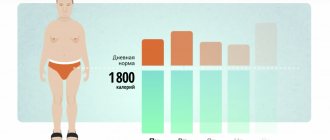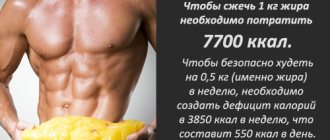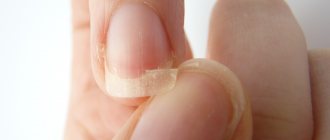In this article we will tell you:
- What are calories
- 4 reasons why you shouldn't count calories
- Description of nutrients
- Energy consumption formula
- Is it possible to lose weight without counting calories?
- 3 Interesting Experiments Showing the Benefits of Nutrient Counting
- 3 options for getting out of a situation when you don’t want to count anything
- 5 final tips for losing weight
- The consequences of obsessing over calorie counting
It is generally accepted that you need to know the proportions of BJU (proteins, fats and carbohydrates), and 30 kg will disappear in six months, as if they never happened. But it's not that simple. The calorie content of foods may vary depending on the method of preparation. Calories in one product can vary depending on the cooking method and even the cutting method.
Nutrients are biologically active elements involved in the life of the body. They are divided into microelements (vitamins and minerals) and macroelements (proteins, fats, carbohydrates). There are many of them, and each has its own task in maintaining health. It is enough to identify what the body lacks in order to fill the gaps. In words, everything sounds simple, but in reality there are some nuances that should definitely be taken into account when calculating nutrients.
What are calories
A calorie is a unit of energy. 1 calorie represents the amount of energy that must be expended to heat 1 gram of water by 1 degree Celsius. Energy is usually measured in joules, but when it comes to food and its value, we use a different unit of measurement - the calorie.
At the same time, energy is not only consumed by us, but also spent. If you eat a large amount of high-calorie foods, the energy obtained from them will be used up during physical activity, and the remainder will be stored by the body in the form of subcutaneous fat.
On average, 1 gram of protein (fish, meat) and 1 gram of carbohydrate (cereals) contains approximately 4.1 kcal, and 1 gram of any fat (for example, olive oil) contains about 9.3 kcal.
Obviously, in order to lose weight, you need to consume food of such calorie content and volume that will create an energy deficit in the body. Under such conditions, the body that needs it will begin to spend what it has accumulated from its own resources, including subcutaneous fat and muscles (therefore it is important to give them a load).
When reading food labels, you should understand that the figures presented there are fairly average, calculated without taking into account cooking and energy costs for digestion.
The number of calories in 100 grams of the same product, presented in different forms, may be different. What is this connected with?
- Culinary processing.
Research from Harvard University has shown that cooking foods increases their calorie content.
- Molecular features
. For example, potatoes will have different caloric contents when cold and when hot, this is influenced by resistant starch, which in a cold product serves as food for bacteria.
Interestingly, alcohol contains no proteins, no fats, no carbohydrates, but it does contain calories: there are 7 kcal per 1 gram of pure alcohol.
The food we eat is mostly processed by the digestive organs, but not all of it. In this regard, all people are individual; each of us has a different process of assimilation of food. This depends on the health of the gastrointestinal tract, metabolism, and the method of preparing food.
Description of nutrients
Nutrients are biologically significant elements that the human body needs in order for it to function normally. They are divided into micronutrients and macronutrients. For us, they are indispensable because they are not produced in the body, but enter it along with food. A person can remain healthy only if he receives all the substances he needs on a regular basis.
- Macronutrients
Macronutrients are substances that provide the body with energy. A balanced diet that contains all macronutrients allows the human body to function normally. Thanks to them, the synthesis of hormones, enzymes and other elements occurs, ensuring adequate development and growth of the body.
These include:
- proteins;
- fats;
- carbohydrates.
- Micronutrients
Micronutrients are substances that come with food or special supplements in microdoses.
These include:
- vitamins;
- minerals.
In addition, water is considered a macronutrient. Our body consists of 55-65% water, so it urgently needs it. On average, a person should drink from 1.5 to 2.5 liters of water per day.
Despite the small amounts of micronutrients supplied with food, they have a huge impact on the body, and without them you can easily get a whole bunch of ailments. Let's remember calcium. Deficiency of this mineral underlies 147 diseases. This also applies to other micronutrients.
Thanks to macroelements, we receive the energy needed by cells, tissues and organs. The amount of energy that each person needs is highly individual and depends on the level of physical activity. And also from the work of metabolic reactions and the hormonal system.
To prevent the body from experiencing stress, you need to monitor the quantity and quality of proteins, fats, carbohydrates, as well as vitamins and minerals that come to us from food, that is, it is important to count nutrients, not calories. Their deficiency provokes diseases and all sorts of addictions such as cravings for sweets or fatty foods.
Energy consumption formula
The interaction in the human body between incoming and expended energy can be expressed by the following formula:
Energy balance (Eb) = Energy that was received (Ep) – Energy that was expended (Er)
or
Eb = Ep - Er
Let's look at these 3 components in more detail.
- The Energy That Came In (Ep)
The only source of energy for the body is food, namely: proteins, fats and carbohydrates.
However, not all food is absorbed in the human body. It depends on the degree and method of cooking, on how thoroughly a person chews, how correctly his digestive enzymes work, etc.
We recommend
“Body detox: how to do it correctly” Read more
The BJUs that were nevertheless mastered are distributed as follows:
- 1 gram of protein gives 4 kcal when broken down
- 1 gram of carbohydrates – 4 kcal
- 1 gram of fat – 7.5 kcal
- 1 gram of alcohol – 7 kcal
These energy sources are in our formula Ep.
- What is energy spent on (Er)
After food has been digested and nutrients have been absorbed, they are broken down to produce energy, which is either used by the body to perform various tasks or stored.
There are three main items of human energy expenditure:
- The cost of maintaining life is basal metabolism.
- Digestion costs.
- Expenditures on physical activity, which is divided into training and non-training.
Energy consumption to maintain life is the largest and amounts to approximately 60-70% of all energy entering the human body. This energy is spent, for example, on breathing, blood circulation, maintaining body temperature, cell growth and regeneration.
Digestive expenditure is the amount of energy the body needs to digest incoming food. This is the second largest item of energy expenditure and accounts for 10-20%.
Finally, the third part of energy expenditure is the expenditure on maintaining activity (mental, physical).
To calculate the number of calories needed per day, several formulas are used, the most popular of which is the MifflinSt formula. Jeor. It looks like this:
Physical activity rate:
1 – low physical activity;
1.3 – average physical activity;
1.5 – high physical activity.
Example
: woman, 32 years old, 54 kg, height 167 cm, average physical activity.
Daily calorie intake = (54*10 + 167*6.25 – 32*5-161)*1.3 = 1641 kcal per day.
No math
How to lose weight without counting calories? This is possible, and effective and for a long time.
The secret to losing weight 1. Success is influenced not only by the amount of food, but also by its qualitative composition: the proportions of proteins, fats and carbohydrates. The goal is to provide a balanced diet. Otherwise, in search of missing nutritional components, you may overeat.
So, you can and should eat. You don't have to lose weight hungry. Food must be complete in composition and quantity. Among the nutrients there are no unnecessary ones. And eating without counting calories copes with this.
The food eaten enters the digestive tract, is processed to the point where it can be absorbed and enter the organs and tissues through the bloodstream. Proteins from foods are broken down into amino acids, fats into fatty acids and glycerol, carbohydrates into glucose, fructose, galactose.
Fats and carbohydrates provide energy. If these nutrients are supplied in a strictly limited manner, protein consumption begins and muscle mass decreases.
Briefly about the nutritional components:
- Squirrels. All nutritionists talk about how important it is to meet the norm for complete protein in the diet. The tissues of a normal person consist of 15-20% protein. Muscle fibers and cell walls are built from it. Structural elements, underlying tissues, motor ability, immune system reactions, enzyme and hormonal components are provided by protein. The daily amount of protein for an adult averages from 1 to 1.7 g per kilogram of ideal body weight. This is an indicator for a person who is not overweight. A person losing weight, with a reduced intake of fats and carbohydrates, needs at least 2 g per kilogram of ideal body weight. In one meal, the body can absorb a maximum of 40 g of pure protein (protein). For example, a piece of turkey the size of a cigarette pack contains this amount of protein. Excess protein is sent to feed pathogenic intestinal flora. Protein is contained in different types of meat, fish, dairy products, and legumes.
- Fats. A typical mistake when losing weight is to prohibit the consumption of fats, without which the body cannot exist. Fat is a plastic material that is a component of cell membranes (cholesterol), the membrane of nerve membranes. This is a substance for the production of certain hormones. The absorption of vitamins A, D, E does not occur without its help. The proportion of fat in the brain is 60%. The participation of fats in body processes as a whole has an impact on health. A person of normal weight is recommended to consume fat up to 30% of the daily diet. When losing weight, you need to reduce this figure by half, to a maximum of 40 g per day. Fat contains meat, fatty fish, dairy products (animal) and vegetable oils, nuts. Omega-3 fatty acids are valuable.
- Carbohydrates. This is the main energy supplier. During processing, carbohydrates are converted into water, carbon dioxide and energy. They nourish the brain and ensure the functioning of all systems. It is important to understand that there are simple carbohydrates (sweets, baked goods, ice cream and other products containing refined sugar) and complex carbohydrates (grains, cereals, fruits, vegetables, bran). When losing weight, you need complex (long-lasting) carbohydrates. You should not consume less than 50 g of carbohydrates daily; those losing weight are recommended to consume 2 g per 1 kg of ideal body weight.
Determination of ideal (optimal) body weight:
- 100 is subtracted from height in cm
- 150 is subtracted from height in cm and multiplied by 0.25
- the indicator of the second action is subtracted from the indicator of the first action.
Is it possible to lose weight without counting calories?
Yes of course. However, this requires so-called metabolic flexibility, that is, the body’s ability to easily switch from one energy source to another, while effectively using the one that is available. In addition, it is the ability to quickly destroy fat reserves without stress and hunger.
What happens if your body does not have this quality, or rather the entire metabolic process is disrupted:
- the body has fat reserves, but they are not burned due to frequent feelings of hunger;
- Frequent consumption of carbohydrates leads to a lot of glucose in the blood, which the body is unable to get rid of, and this leads to serious fluctuations in sugar levels;
- The fats eaten are stored by the body, which cannot burn them.
To understand how flexible your metabolism is, answer two questions:
- Can I live without snacking for more than three hours?
- Does the weight come off quickly when I put effort into it?
If the answer to both questions is “no,” you probably have problems with your metabolism.
With a balanced diet, a person may not think about snacking for up to 5-6 hours between meals. At this time, the level of insulin, which increases when eating, returns to normal, and the body begins to fight fat reserves, which is facilitated by glucagon.
If you want to lose weight, try eating minimally processed foods. This happens for the following reasons:
- The body spends more energy on chewing and digesting coarsely cut and unheated food.
- Based on its molecular structure, raw food is healthier. For example, the glycemic index of raw beets is 30 units, boiled or baked – 65 units.
- The longer you chew your food, the stronger the signal to your brain that your body is full.
Eat when you're hungry.
There are actually several types of hunger. We must focus specifically on physical hunger. To do this, estimate your hunger using the table below.
Place your palm on your stomach and clearly ask yourself how hungry you are. Do you want to eat because you are physically hungry or are you just bored? Maybe you are worried, so you decided to fix the problem?
The consequences of obsessing over calorie counting
Constantly thinking about the caloric content of foods can lead you to orthorexia - a nervous disorder, which consists precisely in the fact that a person becomes fixated on counting these numbers and eating right. And any stress means increased cortisol and difficulty losing weight. Do you want to become slim? Keep calm!
It is impossible to calculate everything, and each organism has its own needs. Genes, hormonal levels, metabolism, the state of the microbiome - all this affects the absorption of food. Just strive for the right diet without complex calculations and exercise at your own pace.
Of course, if you're just starting out on your nutrition journey, it makes sense to count nutrients and calories to understand the system. But you will quickly figure out what’s what, and there will be no need to deal with it further. Over time, it will become clear which foods and in what volumes provide saturation, energy and lightness in the body.
Don't forget that the basis of proper nutrition is its variety. Eating boiled breast and cucumber is not bad in itself, but not every day. Approach the process of losing weight and healing your body prepared, study which foods are healthy and which are undesirable to consume, remove the empty calories that we talked about at the beginning of the article, and act consciously.
Less is more
Weight loss secret 2. There are many methods that offer the right diet for weight loss. Some have a right to exist, some simply do not stand up to criticism.
Nutrition , which, as a rule, comes without counting calories , is fractional nutrition. Food is taken 5-6 times a day, portions become half the size. The optimal serving size is equal to the volume of the glass. That is, equal-sized portions are taken at approximately equal intervals.
This diet does not allow a ravenous appetite to be aroused, in which a lot is eaten and everything that comes to hand. It is also psychologically easier when you know that the next meal is in 2.5-3 hours, and therefore there will be no discomfort from hunger.
At first, it is difficult to want to eat the amount of food that you are used to. This will pass. To “deceive the eyes,” you can replace the dishes with another smaller one.
Sample meal schedule to choose from:
- breakfast (whole grain porridge, wholemeal bread with a little butter, coffee);
- second breakfast (fruit, 15 g nuts, natural yogurt)
- lunch (boiled poultry with vegetable salad)
- afternoon snack (a portion of cottage cheese, a protein shake)
- dinner (baked fish with fresh or stewed vegetables)
- light snack before bed (kefir, plain yogurt, whites from two boiled eggs).
There are more meals, everything is individual, the length of the day is different for everyone.
Make your menu varied and tasty, use homemade seasonings and sauces.
The composition of dishes is determined according to the principle of balancing all nutrients (BJU). If you don’t do this, but eat simple carbohydrates and exceed the norm for fats, then there is no benefit from fractional nutrition, only excess weight gain.
At first glance, it may seem that eating fractionally is difficult for those who work and sometimes don’t even have time to have lunch. But by thinking through the menu in advance and preparing a food container with you, you can devote some time to eating during the working day. If one of the meals is missed, it should not be taken with the next meal.
So, the advantages of fractional nutrition:
- With such a diet, the hunger hormone ghrelin is not produced in large quantities, since there are no long breaks between meals. You will no longer want to pounce on food and, as if in oblivion, sweep everything off the table, and then suffer from a full stomach and remorse.
- Fractional meals are not a diet, but a change in eating behavior. There are no treacherous thoughts, like, now I’ll endure it, and only then I’ll have a blast. Here it can be argued that there are still restrictions on simple carbohydrates and fats, as with a diet. But the realization that your own stomach is not a garbage container will give you the right thoughts. The super prize is that the achieved weight is maintained.
- The gastrointestinal tract is not overloaded, and the stomach returns to its normal volume over time. The risk of diseases of the digestive system is reduced.
- Blood sugar levels remain at relatively normal levels at all times. There are no sudden surges that require increased insulin production.
- Fractional meals are psychologically easier. Long periods of hunger cause discomfort and provoke breakdowns in eating useless foods.
This diet is suitable for healthy people. Medical nutrition recommendations may vary depending on the disease. The general principle remains: low-calorie dishes 100 kcal per 100 grams in total, balanced nutrition, regimen, no hunger.









